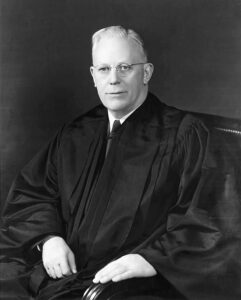
The landmark case of Miranda v. Arizona addressed the question of whether interrogating individuals without notifying them of their rights to counsel and protection against self-incrimination was a violation of their Fifth Amendment rights.
The Fifth Amendment of the United States Constitution reads: “No person shall be held to answer for a capital, or otherwise infamous crime, unless on a presentment or indictment of a grand jury, except in cases arising in the land or naval forces, or in the militia, when in actual service in time of war or public danger; nor shall any person be subject for the same offense to be twice put in jeopardy of life or limb; nor shall be compelled in any criminal case to be a witness against himself, nor be deprived of life, liberty, or property, without due process of law; nor shall private property be taken for public use, without just compensation.”
The Miranda case arose from several cases that occurred throughout the country, all of which featured a defendant not given a warning of their rights at the start of their police interrogation. In several of these cases, the police had forced the petitioners to sign statements that were made without informing them of their right to counsel. These instances (Vignera v. New York, California v. Stewart, Westover v. United States) were consolidated together in the Miranda case.
The petitioner in the Miranda case was Ernesto Miranda, a Phoenix resident who was charged with rape, kidnapping, and robbery. During Miranda’s police interrogation, he allegedly confessed to committing the crimes, which was later used in his trial as evidence to sentence him to 20 years in prison. However, Miranda appealed to the Arizona Supreme Court, claiming that the police had unconstitutionally obtained his confession because they did not inform him of his right to counsel. After the state court disagreed and upheld his conviction, Miranda appealed to the U.S. Supreme Court, which reviewed the case in 1966.
In a 5-4 decision, the Supreme Court ruled for Miranda, holding that prosecutors were prohibited from using statements from defendants if they had not been informed of their legal rights. Therefore, Miranda’s confession could not be submitted as evidence against him in his criminal case. This led to Miranda’s conviction ultimately being reversed. The Court reasoned that these procedural safeguards would secure the privilege against self-incrimination for United States citizens and prevent governmental abuse. Additionally, this ruling would protect against false confessions. In the court’s opinion written by Chief Justice Earl Warren, the court specifically outlined the aspects of police warnings that are necessary to relay to suspects, including the right to remain silent and the right to have an attorney present during interrogations.
The term “Miranda rights” that remains in use today has its origins in the Miranda v. Arizona case, and continues to balance police authority with individual rights.
Now, upon arrest, police officers are required to recite the following message:
“You have the right to remain silent. Anything you say can and will be used against you in a court of law. You have the right to an attorney. If you cannot afford an attorney, one will be appointed for you.”
If a police officer fails to read you the above rights, any statement or confession made is presumed to be involuntary and cannot be used as evidence in a criminal case. Additionally, any evidence that is discovered from the involuntary confession is likely to be thrown out in a criminal case.
To listen to the actual oral arguments from the case, click here.
Back to Crime Library
|
|
|
